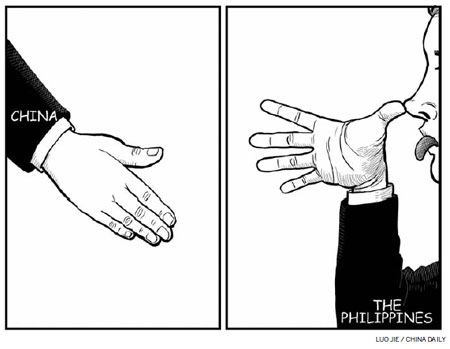
The Philippines should seek a diplomatic solution to the ongoing dispute over the sovereignty of Huangyan Island. China's position is firm; the government prefers diplomatic negotiations to resolve the current tensions, but it will unswervingly safeguard its territorial sovereignty.
The Philippines' unrealistic ambition to grab China's Nansha Islands, of which Huangyan Island is part, has led to its gamesmanship over the past month. This has included harassing Chinese fishing vessels, stating its intention to seek international arbitration, trying to rename the island and removing Chinese signs and monuments and inciting anti-China demonstrations in the Philippines.
For a long time, China's restrained, calm and constructive attitude toward disputes in the South China Sea has been taken advantage of by some countries, especially Vietnam and the Philippines, who have been emboldened to encroach on China's islands and reefs, territorial waters and resources in the South China Sea. They have even sought to introduce third parties into the disputes in an attempt to internationalize the South China Sea and intimidate China.
Over the years, China has insisted on one-on-one dialogue with the countries disputing its sovereignty of certain territories, but with the United States as the puppeteer behind the scenes, Vietnam and the Philippines have chosen to rebuff China's friendly intentions and its proposal to "put aside disputes and seek common development".
With the US' strategic center of gravity shifting to the Asia-Pacific region, the South China Sea issue provides an "entry point" for Washington's new strategic deployment. Against this background, the Philippines and Vietnam believe their opportunities are coming and they are rushing to "rake in the profits" on offer in the South China Sea.
Despite China's low-key restraint, offer of mutually beneficial economic cooperation, diplomatic protests and consultation within ASEAN, the Philippines insists on provoking China.
Clearly the Philippines has been emboldened to run amok in the South China Sea because it thinks it has the military might of the US behind it.
On May 9, the Philippines Foreign Affairs Secretary Albert del Rosario issued a statement that repeatedly mentioned Washington's commitment to the Philippines-US Mutual Defense Treaty to prove that the Philippines and the US are longstanding allies.
But although the Philippines has been trying to use the ambiguity of the treaty to satisfy its wishful thinking that the treaty applies to the South China Sea, the US has never given a clear response, nor any substantial commitment to the Philippines over the South China Sea issue. US Secretary of State Hillary Clinton and Defense Secretary Leon Panetta have stressed the US is not taking sides in the dispute, although they have assured the Philippines the US will honor the 1951 mutual defense treaty.
In fact, by "returning to Asia" the US wants to create discord and chaos in the region so as to sell arms and stimulate its economic recovery. But the US does not want to end up being dragged into a conflict with China by the irresponsible actions of its smaller allies.
However, Art Villasanta, a Philippine defense expert and regular contributor to the Philippine Daily Inquirer has said the Philippines has nothing to lose from escalating the current war of words with China over Huangyan Island, as China will not use force because it is aware of the fatal consequences military action would have on its economic recovery and its growing political stability. He concluded that by continuing to raise its voice against China and keeping the international community's attention on the issue, the Philippines will be playing its best card.
These remarks reflect the Philippines risk-taking mentality in dealing with China.
By intensifying the dispute between the two countries, Philippine President Benigno Aquino III is trying to shift attention from his country's domestic woes, which are a direct result of his poor performance in managing economy and internal affairs. He is hoping that he can intimidate China by leaning on the US.
But he should realize that China will never be intimidated and will safeguard its territory with force if necessary.
The author is a researcher with the China Centre for Public Policy Studies at Fudan University.
(China Daily 05/28/2012 page9)